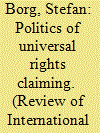| Srl | Item |
| 1 |
ID:
159220


|
|
|
|
|
| Summary/Abstract |
This article explores the intersections of theory and community knowledge, experiences and imagination to illustrate how Kyrgyzstan’s informal settlements contest both normative politics and current global security practices. Instead of viewing informal settlements or the Kyrgyzstani state as disparate objects on and by which security is respectively imposed and enacted, how security differences are pronounced, circulated, resisted and reformulated through Rancièrian politics is examined. In this process, the Kyrgyz community-relational concept of yntymak is brought forth as a vital practice of organization and place-making in and against adversarial attempts at governance. Reconfiguring politics around specific community practices exposes the utilitarian shortcomings of neoliberal governance methods and typical conceptions of security.
|
|
|
|
|
|
|
|
|
|
|
|
|
|
|
|
| 2 |
ID:
153256


|
|
|
|
|
| Summary/Abstract |
This article contributes to a theoretical understanding of rights claiming as a specific form of political practice. The article develops and defends a post-foundationalist understanding of rights discourse as a way of making a claim to social change through appealing to a universal and illustrates such an understanding with the contestation over women’s rights in post-revolutionary Tunisia. To develop this argument, the article draws on Jacques Rancière’s notion of political subjectification and Ernesto Laclau’s engagement with the relation between the universal and the particular. To examine the relevance of such conceptualisation, the article turns to the struggle over women’s rights in post-revolutionary Tunisia, where secular and sacred understandings of the universal have been invoked frequently through rights discourse. In this context it is shown that claims to the universal give rhetorical force to rights discourse, and instead of depoliticising social relations, which rights discourse is often charged with, such claims are vital for political efficacy. However, whereas Laclau’s position helps us to understand rights as a language of resistance, a more robust defence of the universal is needed to defend rights in terms of emancipatory political change. To pursue this argument, the article turns to Rancière’s defence of axiomatic equality.
|
|
|
|
|
|
|
|
|
|
|
|
|
|
|
|